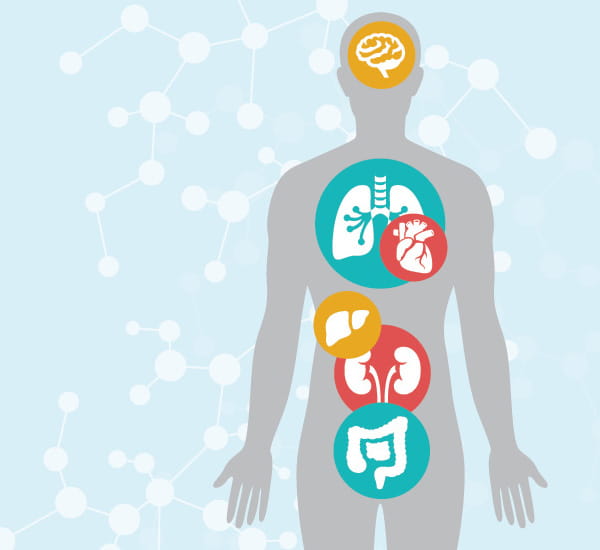Familial hypercholesterolemia
A change in certain genes is associated with familial hypercholesterolemia (or FH), an inherited condition that causes high cholesterol.
What is familial hypercholesterolemia?
Familial hypercholesterolemia (FH) is a common genetic condition that causes high cholesterol. Due to a gene change, or mutation, people with FH have high LDL cholesterol or “bad cholesterol.” Untreated, FH leads to an increased risk for early heart attack and stroke.
A change in the PCSK9, APOB and LDLR genes is associated with FH:
LDLR gene change
The LDLR gene helps your cells capture LDL cholesterol from the bloodstream.
PCSK9 gene change
The PCSK9 gene help your cells break down LDL cholesterol.
APOB gene change
The APOB gene helps your LDL cholesterol be found and captured by the LDL receptor.
When these genes are changed or aren’t working like they should, high levels of blood cholesterol can block your arteries and lead to conditions like heart disease, heart attack and stroke. With proper treatment, including medication and healthy lifestyle behaviors, you can reduce your risk of developing these conditions.
Understanding your risk
Like other genetic conditions, FH is inherited and passed down from family members. And left untreated, it can lead to potentially fatal heart attacks and strokes in younger adults.
Living with FH
If you’ve been diagnosed with FH, your healthcare provider can help you manage your risk to reduce your chance of a future heart attack or stroke. This may include:
• Checking you for high cholesterol, which should start in early childhood for anyone at risk to have FH (as young as age 2).
• Aggressive treatment to lower high cholesterol (for example, using medications such as statins).
• Managing other risk factors for heart diseases like high blood pressure and diabetes.
• Healthy lifestyle changes, such as eating a heart-healthy diet, getting regular exercise, managing your weight and not smoking.
• Medical tests to look for existing heart or blood vessel disease.
What does this mean for my family?
Your blood-related family members may have the same genetic change. In fact, your children and siblings have a 50 percent chance to have the same genetic change. Distant relatives may also be at risk.
In a few families, there may be two FH-related gene variants in one person, one inherited from each parent. This causes more severe FH, called homozygous FH.
If you have FH, your at-risk family members should receive genetic testing — this way, they can get treatment to prevent heart issues. A genetic counselor or doctor can help to arrange the testing. And most insurance companies will pay for it.
FH and pregnancy
Some LDL-lowering drugs can be harmful to take during pregnancy. If you’re taking LDL-lowering drugs, and plan to become or just found out you’re pregnant, talk to your doctor right away. These drugs may include:- Rosuvastatin (Crestor)
- Atorvastatin (Lipitor)
- Simvastatin (Zocor)
- Pravastatin (Pravachol)
- Lovastatin (Altoprev, Mevacor)
- Fluvastatin (Lescol, Lescol XL)
- Pitavastatin (Livalo)
Resources
Patient Resources
The Family Heart Foundation: A patient-centered non-profit foundation that is dedicated to research, advocacy and education of all forms of FH.
The National Society of Genetic Counselors “Find a Genetic Counselor Tool”: This website can help you find a genetic counselor in your area.
The American College of Medical Genetics and Genomics: This website can provide a list of geneticists in your area to help with diagnosis and treatment.
The Foundation of the National Lipid Association: Supports education, research and community outreach related to cholesterol.
American Heart Association: As an organization dedicated to fighting heart disease and stroke, this website contains information for patients and health care providers.
Genetics Home Reference: This website provides information about the effects of genetic variation on human health.
Provider Resources
Familial Hypercholesterolemia: Screening, diagnosis and management of pediatric and adult patients: An executive summary providing clinical guidance from the National Lipid Association Expert Panel on Familial Hypercholesterolemia
National Lipid Association: This website contains information aimed to enhance the practice of lipid management in clinical medicine.
American Heart Association:This website is dedicated to heart health, with a portfolio of content dedicated to the cardiovascular and stroke professional.
Gene Reviews - Familial Hypercholesterolemia: This Gene Review provides a detailed description of FH, including the clinical characteristics, diagnosis and testing, genetic counseling, surveillance and medical management.
Online Mendelian Inheritance in Man® (OMIM): OMIM is a comprehensive, authoritative compendium of human genes and genetic phenotypes that is updated daily.
Find a provider
If you have these genetic variants, you may be referred to:
- A lipid specialist or clinician with expertise in FH (often through cardiology)
- A medical genetics and/or genetic counseling consultation
If you have children, they should have genetic testing for their specific variant to learn if they inherited the risk for FH or not. Their cholesterol levels should also be checked when they are as young as 2 years old. And if their cholesterol levels are high, they should see a lipid specialist.

